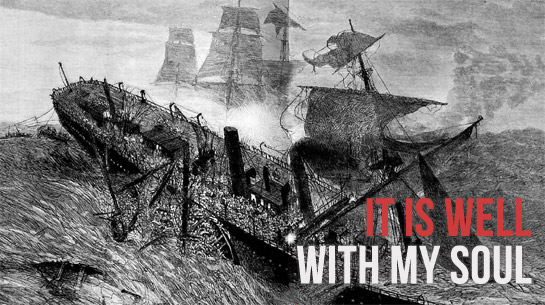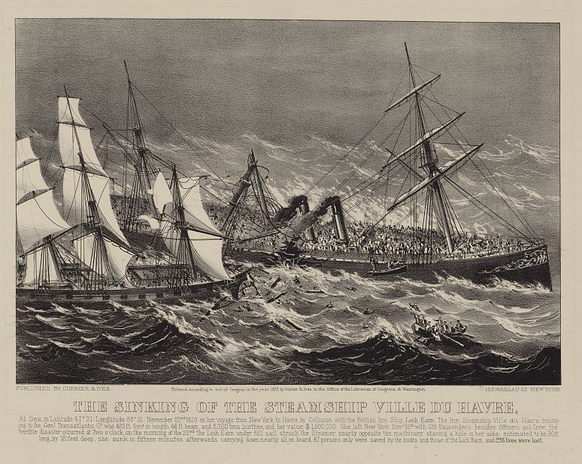
3/4/2020 – Pastor Brian’s Blog –
I love history and I love to read the backstories to many of the hymns I grew up with. For the next few months I plan to share some of those stories with you on the 1st Wednesday of each month. I hope you too will enjoy these stories, as it gives new life to the words of these hymns that continue to be sung in churches around the world.
One of the most amazing men in the Bible to me is the man Job. God said that when it came to His servant Job… “There is no one on earth like him; he is blameless and upright, a man who fears God and shuns evil.” (Job 1:1) It would not be long after this statement that Job would prove God to be right.
One day a messenger comes to Job to tell him that the Sabeans came and stole all his 500 yoke of oxen and 500 donkeys as well as killed all of his servants. Before that servant finished speaking, another one of his servants came and said that fire from heaven came and burned up the 7,000 sheep and consumed his servants. Before that servant finished speaking, another servant came to inform Job that the Chaldeans made a raid on his 3,000 camels taking them all and killing his servants. Then the most painful news that a parent could even hear arrives before the last servant could finish his story. This servant came to tell Job that a great wind came, struck the four corners of the oldest son’s house where all the children were feasting, and the house collapsed killing all 10 of his children.

Now Job could have responded in many ways, yet Job only confirmed what God knew to be true… Then Job arose and tore his robe and shaved his head, and he fell to the ground and worshiped. He said, “Naked I came from my mother’s womb, And naked I shall return there. The LORD gave and the LORD has taken away. Blessed be the name of the LORD.” Through all this Job did not sin nor did he blame God. (Job 1:13-22). God could trust Job through adversity and because of that we are still talking about his life today.
On Sunday evening October 8, 1871, a fire began in Patrick and Catherine O’Leary’s barn at 137 De Koven Street on Chicago’s west side. When the flames subsided on Tuesday morning, the Great Chicago Fire had consumed more than three square miles (some 2,000 acres) of the city, taken 300 lives, left 100,000 without shelter (about a third of the population), and destroyed property valued at nearly $200 million. It would also change the life of another “Job,” Horatio Spafford.
Spafford, a prosperous lawyer and devout Presbyterian church elder, and his wife Anna, were living comfortably with their four young daughters in Chicago. This lawyer had invested much of his money into downtown Chicago real estate and Spafford had lost much of his wealth to the fire. And his one and only son had also died about that same time.
For the next two years Horatio and his wife Anna, who were also friends of the well-known evangelist Dwight Moody, assisted the homeless, impoverished, and grief-stricken people of Chicago.
After about two years of such work, to benefit his wife’s health, Spafford decided to take a vacation. They were to go to England to join Moody and Ira Sankey on one of their evangelistic crusades, then travel in Europe. At the last moment, Spafford was detained by real estate business, but sent Anna and his four daughters ahead on the luxury steamer Ville du Havre. On November 21, 1873, this luxury steamer collided with the British iron sailing ship the Lochearn off Newfoundland, and sank within minutes.
Though Horatio’s wife, Anna, was able to cling to a piece of floating wreckage, their four daughters, Maggie, Tanetta, Annie, and Bessie were among the 226 who drowned. Nine days after the shipwreck Anna landed in Cardiff, Wales, and cabled Horatio, “Saved alone. What shall I do…”
After receiving Anna’s telegram, Horatio immediately left Chicago to bring his wife home. On the Atlantic crossing, Spafford stood hour after hour on the deck of the ship anxious to arrive in Cardiff, Wales to rejoin and comfort his wife. When the ship passed the approximate place where his precious daughters had drowned, this latest “Job,” Horatio Spafford would go down into his cabin, being sustained and comforted by an all-powerful God, wrote the words, “When sorrows like sea billows roll… It is well with my soul.”

God may never ask you to give up your children, your wealth, or your health, but whatever God has asked of you, are you willing to be a current day “Job” who would say… “Naked I came from my mother’s womb, And naked I shall return there. The LORD gave and the LORD has taken away. Blessed be the name of the LORD.”
No matter what the circumstances swirling around you, be willing to be a present day “Spafford” who will look at whatever life throws at and sing… “When sorrows like sea billows roll… It is well with my soul.”
May our families, friends, and those that follow behind us, associate our lives with the likes of Job and Horatio Spafford. We can do that you know. Don’t believe me? You can believe the greatest example of all time, Jesus, who said… “nothing is impossible with God.” Luke 1:37
It is well! God’s got this!


